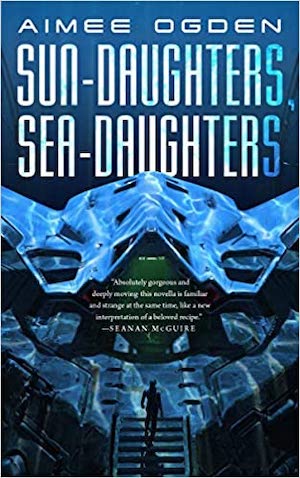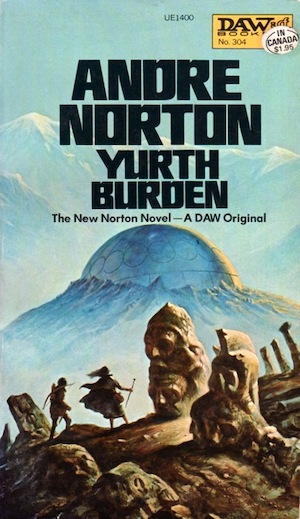I have said before that plotting was Andre Norton’s strength, and characterization one of her notable weaknesses. Yurth Burden reads like an object lesson in what happens when the plot completely dominates the characters.
By plot in this context I mean “things that happen in the course of the novel,” without reference to what or whom they happen to. These things are determined by the author. They may be constructed according to an outline, or they may be developed freehand—the writer writes, and the story evolves as it goes. Either way, it’s the writer who drives the plot, and the characters serve more or less as game pieces. They don’t actually determine what happens.
Norton novels often signal that the plot is doing the driving. Characters do things “somehow,” without knowing how or why. They’ll act without thinking, or do things that are out of character. They’re often subject to compulsion, either from other characters in the story or from forces beyond their understanding. Mind control is a major theme in Norton novels, whether mechanical or magical, mortal or divine.
In Yurth Burden, neither Elossa, the viewpoint character, nor Stans, her opposite number, has any agency to speak of. Elossa the Yurth girl is under compulsion to journey into the mountains to discover the ancient knowledge of her people. Stans the Raski is bound by ancestral geas to pursue her and destroy her. They both accept the compulsion, but it’s not a choice. It’s laid on them from outside.
The world they live in has a strange, schematic feel to it. Both cultures are controlled completely by ancient guilt, fear, and hate. Raski hate Yurth utterly, for no clear reason. It just is. Yurth live with ancient guilt and shame, but until they complete their journey, they have no knowledge of what it means. Their whole culture literally lives in sackcloth and ashes, without change from generation to generation.
When we do finally find out the why and how, my reaction was, “Is that all?” Yes, the damaged Yurth starship crashed into a major Raski city because of one navigator’s error, and the consequences were devastating and tragic, but the outcome doesn’t make sense. Both cultures shatter completely, neither makes the slightest effort to change anything, and it all goes on and on for centuries—until Stans finally follows Elossa all the way to the ship and they both find out where it all began. And then suddenly they decide to join forces and tell the world. Because neither side ever thought of doing any such thing ever before, from the beginning of time. And no Yurth or Raski ever tried to connect in any way despite the Yurth being telepaths and having very good reasons to want to make peace and atone for what they did.
That abrupt shift in how characters feel about each other is typical for a Norton ending, but here it keeps on going. It seems she started off with a short story and then opted to turn it into a novel. The rest of the action lurches up and over the ship sequence, staggers out of the city, gets attacked and captured by monsters, gets dumped into a boat and launched down a roaring river, and ends up fighting Evil Immortal Priest-God With Legions Of Mind-Controlled Slaves. Which doesn’t explain why both cultures locked into one set of unalterable behaviors for centuries, though it does make the destruction of the city seem somewhat more of a good thing for the Raski who had been oppressed by a tyrant. They may have been bombed back to the Neolithic, but they’re doing their own hating and fearing without being controlled by anything except their own cultural inertia.
Buy the Book


Sun-Daughters, Sea-Daughters
The tyrant, meanwhile, is mind-controlled by some outside force. It’s not clear where the evil Atturn comes from or why he’s on this particular planet, or for that matter why he confines himself to a particular set of caves and doesn’t try to take over the world. He just is, and he just does.
Elossa and Stans’ arrival in his lair conveniently tips everything over. The captive and apparently mind-controlled Yurth have a very much underground telepathic network that just needs one more person to make it strong enough to fight Atturn, but even that fails until Stans is able to physically attack the evil priest whom Atturn is controlling. Then it all falls apart and the world is saved.
Presumably Yurth and Raski in the world at large will then be able to start making peace. Though how that will or can work isn’t clear, since everything that’s happened is completely outside both Yurth and Raski territory, and since both cultures have been so immovably locked into their ancient enmity. Yurth might conceivably pick up the whole story from Elossa and do something about it, but the nontelepathic, deeply xenophobic Raski would more likely kill Stans and become even more hostile to the Yurth. Nor can the Yurth use their powers to help matters, both because it would violate their own laws and because the Raski hate those powers so completely—Elossa’s frequent violations and rationalizations notwithstanding.
It’s not a credible outcome, and it shows Norton’s weakness in conceiving and developing characters. A stronger writer might have worked out the nuances of the characters and the situation, and given Elossa and Stans more depth and complexity. With that she could have found a way through to the conclusion she wanted, rather than getting trapped in the schematics of the plot. If nothing else, her characters might have had more agency, and made clearer, more reasoned choices, rather than being pushed from one episode of mind control to the next.
That would have been a very different book. There are hints of what might have been in Breed to Come, which has a similar dynamic between human/Yurth and indigenous cultures, and a similar concept of a planet that itself, for whatever reason, is innately inimical to one or more of the species who live on it.
All in all, not nearly Norton’s best, though I found it interesting in the ways it encapsulated her strengths and weaknesses as a writer. I’m on to Moon Called next.
Judith Tarr’s first novel, The Isle of Glass, appeared in 1985. Since then she’s written novels and shorter works of historical fiction and historical fantasy and epic fantasy and space opera and contemporary fantasy, many of which have been reborn as ebooks. She has even written a primer for writers: Writing Horses: The Fine Art of Getting It Right. She has won the Crawford Award, and been a finalist for the World Fantasy Award and the Locus Award. She lives in Arizona with an assortment of cats, a blue-eyed dog, and a herd of Lipizzan horses.










